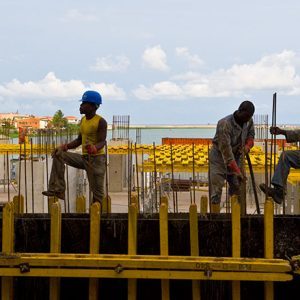
Economic downturns have profound and multifaceted effects on property values in Nigeria. As the economy contracts, several key factors come into play that influence the real estate market.
Decline in property demand
During economic downturns, the demand for real estate typically decreases, leading to a decline in property values. This reduction in demand is often driven by reduced consumer spending power, higher unemployment rates, and uncertainty about future economic stability (BusinessDay). As buyers become more cautious, the real estate market slows down, resulting in lower property prices.
Impact on Property Taxes
Economic downturns can also affect property taxes, which are generally based on assessed property values. When property values decrease, the tax base shrinks, potentially leading to lower property tax revenues for local governments. However, local governments might adjust tax rates to compensate for the decreased property values to ensure continued funding for essential services like schools and emergency services.
Investment in Real Estate
Despite the challenges, real estate remains a relatively stable long-term investment, even during economic downturns. Real estate can act as a hedge against inflation, providing steady income through rentals and potential for capital appreciation over time. Additionally, the Nigerian government’s efforts to improve the ease of doing business in the real estate sector and invest in urban infrastructure can stimulate the market and attract both domestic and foreign investments (BusinessDay).
Urbanisation And The Property Market
Urbanization continues to drive demand for housing in Nigeria, even during economic hardships. As people migrate to urban areas seeking better opportunities, the demand for residential and commercial properties persists. This ongoing demand can help stabilize the real estate market
How the Post-COVID Economic Downturn Crashed the Real Estate Market
The COVID-19 pandemic significantly impacted Nigeria’s real estate market, causing a noticeable downturn across various property sectors. Here’s a detailed look at how the economic fallout from the pandemic affected the market:
Office Space and Commercial Properties
The commercial real estate sector, especially office spaces, was severely affected by the pandemic. The shift to remote work led to a reduced demand for office spaces, causing vacancy rates to spike. In Lagos, for example, the vacancy rate for grade-A office spaces reached 45% by the second half of 2020. New leases for these spaces plummeted by 87% compared to the same period in 2019. Companies, especially multinationals, downsized their office footprints significantly during the pandemic.
Retail Real Estate
The retail sector was one of the hardest hit. Lockdown measures led to a sharp decline in foot traffic, forcing many retailers to shut down or significantly reduce operations. This resulted in cash flow problems and increased vacancy rates. However, by the end of 2020, there was a slight recovery in vacancy rates from 16.3% in June to 12% in December .
Residential Properties
Residential real estate saw mixed effects. While the demand for suburban homes increased due to the shift towards remote work and the desire for less densely populated living spaces, the overall market was still challenged by economic uncertainties. Many Nigerians faced job losses or reduced incomes, making it harder to afford new homes or keep up with mortgage payments. The housing deficit, which stood at an estimated 17 million units, only worsened as construction slowed down and fewer new homes were brought to market (Oxford Business Group).
Industrial Properties and Warehousing
Interestingly, the industrial property sector, particularly warehousing, saw a surge in demand. The pandemic accelerated the shift towards e-commerce, increasing the need for storage and distribution centers. Warehouses became the most sought-after property type during the
The Effect of a Bad Economy on Properties in Nigeria
A poor economic climate impacts the real estate market in several ways, exacerbating challenges for both buyers and sellers.
Reduced Purchasing Power
As economic conditions worsen, the purchasing power of individuals decreases. High inflation rates and unemployment make it difficult for people to afford new homes or maintain mortgage payments. This decline in demand leads to lower property values and a stagnant market (UTM Interest).
Increased Vacancy Rates
Economic hardship often forces businesses to downsize or close, increasing vacancy rates in commercial properties. High vacancy rates can lead to reduced rental income for property owners, further straining their financial situations (Oxford Business Group).
Strain on Property Development
Developers face increased costs and decreased access to financing during economic downturns. This can lead to delayed or abandoned projects, worsening the housing deficit and limiting the availability of new properties (UTM Interest).
Foreclosures and Distress Sales
Economic downturns increase the risk of foreclosures and distress sales as property owners struggle to meet financial obligations. These forced sales often occur at reduced prices, further depressing property values in the market (UTM Interest).
For more detailed insights and further information, visit Mind Intelligence’s website. Stay informed about the latest trends and strategies to manage real estate investments in challenging economic times.

